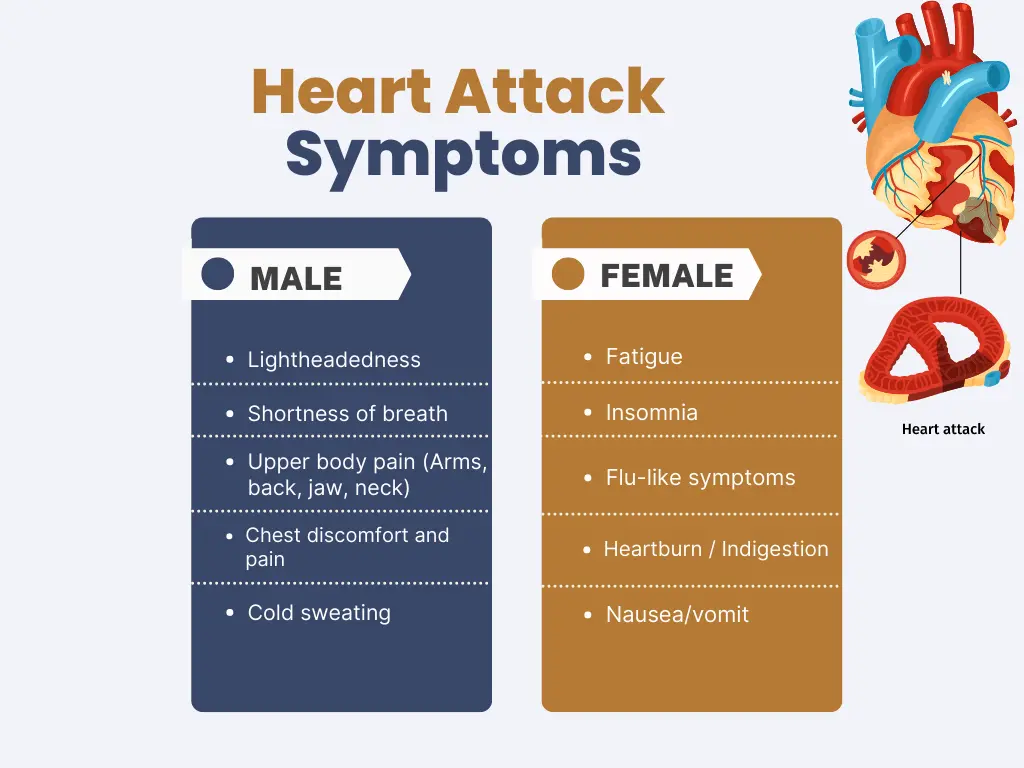There are no alarming symptoms of heart attack that don’t even happen in the chest and it’s not easy to elaborate what’s going on. It occurs especially if you are 60 or older, obese, prone to diabetes, high blood pressure and high cholesterol.
Symptoms of Heart Attack
Never ignore the below mentioned symptoms of heart attack that include
Chest Pain
If you have a heart attack or a blocked artery, you may feel tightness, pain, or pressure in your chest. The heart feels burdensome whereas some mention it like burning or pinching.
The feelings for these symptoms of heart attack may last longer than a few minutes either while you are at rest or when you are doing a physical activity. Also, particularly keep in mind that heart problems or a heart attack without chest pain is common among women.
Indigestion, Heartburn, Nausea, Vomiting or Stomach Pain
Women are more likely to get these symptoms compared to men. There may be an upset stomach for many reasons which is not even related to heart attack, but you need to be cautious that it can also happen as symptoms of heart attack.

Pain in the throat, Jaw or Arm
Pain in the throat or jaw can be probably caused by a muscular issue, a sinus problem or cold but if you experience severe pain or pressure in the center of your chest spreading into your throat or jaw, that can also be a sign of a heart attack.
Also, it always starts from the chest and moves outward causing arm pain which turns out to be heart attacks later.

Sweating
For no obvious reason, breaking out in a cold sweat could also be a signal for heart attack. If this happens along with any other symptoms of heart attack, don’t try to drive yourself.
Dizziness or Lightheaded
If you feel unsteady all of a sudden with chest discomfort or shortness of breath, there are chances where your heart isn’t able to pump the way it should with a sudden blood pressure drop.
Persistent Cough
In most cases, persistent cough cannot be among the symptoms of heart attack. But, if you are prone to a heart disease or disorder, pay attention to the possibility. Long-lasting cough that produces a pink or white mucus, could be a sign of a heart failure.
It occurs when your heart can’t keep up with your body’s demands, causing blood to leak back into the lungs. Consult your doctor to check the reason behind this and get an immediate treatment.
Feel Fatigued or Exhausted
If you suddenly feel winded or fatigued causing significant changes than usual, it is most important to seek a medical appointment with the doctor.
Usually, women get extreme exhaustion or unexplained weakness, starting with a feel of very little ache or pain in the body. These can also be the early symptoms of heart attack.
Irregular Heart Beat
A normal heart can get nervous or excited or skip or add a beat once in a while but if you feel like the heart is beating often or for more than a few seconds, you have to check it with a doctor.
In most cases, these symptoms of heart attack are caused by something that it’s easy to fix, like not enough sleep or too much caffeine. Occasionally, it could be a signal for a condition called atrial fibrillation needing treatment.
Swollen Ankles, Legs and Feet
This could be a sign of a heart attack when blood backs up in the veins, your heart doesn’t pump blood fast enough or effectively as it should, and makes the kidneys harder to remove extra water and sodium from the body causing bloating.
Snoring
Usually, loud snoring like choking or gasping can be a sign of sleep apnea causing extra stress in your heart. You can check with your doctor if you need a sleep study to see if you have symptoms of heart attack.
Preventing Heart Attacks: A Holistic Approach
Preventing a heart attack involves adopting a holistic approach to cardiovascular health. Understanding the symptoms and addressing risk factors are crucial steps in averting this life-threatening event.
Adopt a Heart-Healthy Lifestyle
- Balanced Diet: Consume a diet rich in fruits, vegetables, whole grains, lean proteins, and low-fat dairy.
- Regular Exercise: Engage in moderate-intensity exercise for at least 150 minutes per week.
- Maintain a Healthy Weight: Achieve and maintain a body weight within a healthy range.
- Quit Smoking: Smoking is a major risk factor for heart disease; quitting significantly reduces this risk.
Manage Stress
- Practice stress-reducing activities like meditation, yoga, or deep breathing exercises.
- Establish a healthy work-life balance and prioritize relaxation.
Regular Health Check-ups
- Schedule regular check-ups to monitor blood pressure, cholesterol levels, and overall heart health.
- Follow prescribed medications meticulously to control these risk factors.
Limit Alcohol Intake
- Consume alcohol in moderation, if at all. Excessive alcohol can contribute to heart problems.
Control Diabetes
- Manage diabetes through medication, diet, and lifestyle changes to reduce cardiovascular risks.
Get Quality Sleep
- Aim for 7-9 hours of quality sleep per night to support overall health.
Stay Hydrated
- Maintain adequate hydration to support heart function and overall well-being.
Know Your Family History
- Understand your family’s history of heart disease and share it with your healthcare provider.
Emergency Preparedness
- Be aware of the symptoms of a heart attack and seek emergency medical attention if you experience them.
- Learn basic CPR techniques to assist others in case of a cardiac emergency.
Remember: Prevention is the cornerstone of heart health. By adopting a heart-healthy lifestyle, managing risk factors, and recognizing the symptoms of a heart attack, you can significantly reduce the likelihood of experiencing this serious cardiac event. Always consult with healthcare professionals for personalized guidance on maintaining cardiovascular health.
Conclusion
Recognizing the symptoms of heart attack is crucial for prompt intervention and better outcomes. If you experience chest pain or discomfort, shortness of breath, nausea, or other signs mentioned, seek emergency medical attention immediately. Early recognition and treatment can make a significant difference in minimizing damage to the heart muscle and improving chances of recovery.
Read also the Best Cardiologist in Chennai.



